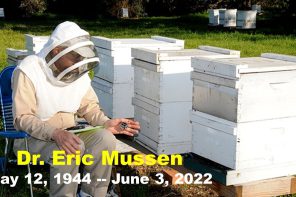By: Asmera Smith
Becoming an apiarist can make a meaningful imprint on the world. It allows you to be conscious of the umbilical cord connecting human beings and nature, as we see in the history of beekeeping in Tuskegee, Alabama.
Beekeeping in Tuskegee also served as a necessary skill that assisted in anchoring Black identity, community, and environmental connectedness.
Since the inception of Tuskegee University, its first president Booker T. Washington emphasized the importance of molding the model citizen with discipline and practical learning through the lens of agriculture. All students enrolled at Tuskegee were once required to learn beekeeping per the curriculum.
Despite agriculture being the focus of the curriculum and designated lifeblood, at the time of its creation, there was an agricultural stagnation that plagued the town of Tuskegee and half of the United States. The South still had a dependency on “King Cotton”. Tuskegee University, at that time, Tuskegee Normal and Industrial Institute, was even housed on an old cotton plantation. The majority of students were either sharecroppers or former sharecroppers.
The boll weevil, the pest responsible for ravaging the majority of the cotton production, was running rampant throughout southern states. In addition to cotton sales being significantly less than their white counterparts, Black people were desperately trying to combat other multiple unfair systemic obstacles.
When Dr. George Washington Carver came to Tuskegee, he restructured and reframed a lot of modalities. Carver knew the lack of understanding of nature and ecological relationships caused poor farm management and a lack of holistic wellness.
Ever connected to the spiritual, Carver would talk about how nature whispers to him, and God speaks through all of its creations. Having that innate connectivity, he held great respect for all creatures. In a 1930 letter, Carver wrote, “The singing birds, the buzzing bees, the opening flower, and the budding trees all have their marvelous creation story to tell each searcher for the truth…I love to think of nature as unlimited broadcasting stations, through which God speaks to us every day, every hour, and every moment of our lives if we will only tune in and remain so…”
Similar to Dr. Booker T. Washington, Dr. Carver highly encouraged beekeeping. So much so, he attempted to convert the majority of cotton farmers into beekeepers. The high increase of beekeepers paired with his emphasis on synergy inside the ecosystem gave a unique edge and allowed higher optimization of bee productivity. He encouraged and improved practices such as; resting the soil periodically, intentional crop selection, crop rotation, and plant diversity. These practices played an enormous part in the success rate of not only soil health but also beekeeping.
There is empirical data that explains the positive correlation between soil health and the increase of honey and solitary bee populations!
Tuskegee pivoted, seeing crop increases, and increased honey production, generating substantial economic savings.
This success was also made possible through community efforts. Through the creation of the Jesup wagon, Carver and his Master’s level student, at the time, Thomas Monroe Campbell, brought lessons to farms. They traveled a total of 800 miles visiting 100 farms in 1907 alone. The Jesup Wagon became the inception of the model for the Federal Farm Extension Programs. However, due to anti-Black racism embroiled in the passing of the 1914 Smith-Lever Cooperation Extension Act, The Department of Agriculture did not award Tuskegee with pioneering the program and even took money away due to a created technicality. Though experiencing this extreme racial injustice, Thomas Monroe Campbell was successfully hired as the first Extension Agent in the United States. He headed the first Cooperative Extension Program in the nation as a Field Agent for The United States Department of Agriculture.
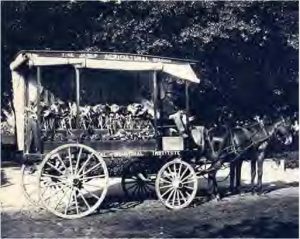
The Jesup Wagon (Tuskegee University Archives)
This innovation and community collaboration occurred time and time again within Tuskegee. To this day, Tuskegee University still operates the longest-running farming conference in the nation, held annually in February. Originally called the “People’s Conference”, the Farmer’s Conference began in Tuskegee on February 23, 1892. In its 130th year, the conference continues on Booker T. Washington’s mission and practice of using agriculture as a vehicle for self-actualization.
By improving community initiative, education, and trade, the formation of communities became more prevalent, as seen with George Ruffin Bridgeforth. Mr. Bridgeforth was a beekeeping instructor at Tuskegee Institute from 1902-1915 and established a highly successful all-Black community of landholders in Limestone County in 1910. Limestone County is a part of Huntsville, Alabama, present-day. Bridgeforth was one of the largest Black landowners at the time.
Black people began having the autonomy to develop wealthy towns, own land, and trade and buy from one another. This possibility was powerful in reinvigorating the self-esteem and the integrity of the Black identity.
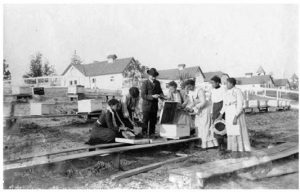
Beekeeping Instructor, Dr. Bridgeforth teaching the Beekeeping Ladies. (The Tuskegee Archives)
Black women, specifically, were able to cultivate their autonomy within this period using beekeeping as one of the tools. Mrs. Maragret Murray Washington, the wife of Booker T, played an active role in creating space for Black women. When she came to Tuskegee, she founded her club, The Beekeeping Ladies, an all-women-led beekeeping organization. This club was nationally recognized and was even mentioned by the successful master beekeeper, entrepreneur, and writer A. I. Root in Gleanings in Bee Culture in 1874.
The spread of the farming gospel also improved community race relations. The white populace in the South was economically struggling alongside the Black population of Tuskegee and benefited from the teachings of Dr. Carver. Moreover, by learning together, trading farming techniques, and interacting with one another, these events facilitated a unique opportunity for healing and collaboration. As scholar Linda O. Hines writes, “Even Southerners who ardently supported white supremacy hailed Carver as one of Dixie’s leading citizens.” This collaboration also helped strengthen relationships that were peaceful and healthy amongst Black and white people.
There existed a small but powerful population that believed in advocating and amplifying Black voices, as seen by A.I. Root. Although built in the pretense of superiority and yields real results of kick-starting generational wealth (read: for some), racism’s true end demolishes everyone. One risks their moral compass; lives in a state of false reality and purpose; and robs themselves of impactful encounters with diverse people when subscribing to racist ideologies. Heather C. McGhee, author of “The Sum of Us: What Racism Costs Everyone, and How We Can Prosper Together.” mentions even the economical losses that racism yields for white people and communities as well. The key to rebuilding our world lay in the power of mutual respect, love, and honoring our similarities along with our differences.
The spirit of innovation, love of community, and love for the environment carried over through multiple generations. Dr. Booker T. Whatley, a former instructor of Tuskegee Institute (in 1974-1981), continued to carry the torch Dr. Carver and Dr. Booker T. Washington ignited. Dr. Whatley is one of the pioneers of restorative agriculture, responsible for creating the concept of Community Supported Agriculture (CSA) farm systems and U-pick farms. He also wrote “How to Make 100,000 Dollars On A 25-acre Farm,” a book used and relevant today. One of the main components that made his model possible was having 60 colonies of bees.
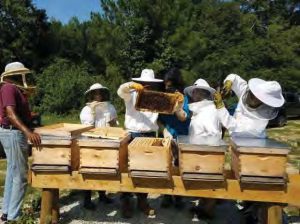
Picture from a TU Bee Club meeting. From left to right: Mr. Bernard Pace, Mentor; Jade Daniels, Vice President; a 2018 member; Dr. Harold Higgins, Mentor; Asmera Smith (author) President; and Hallie Bentley, Mentor
Dr. Whatley frequently taught the community and students alike, hosting open labs similar to Dr. Carver and Dr. Washington.
Mr. Bernard Pace, a current apiarist in Tuskegee, was under Dr. Whatley’s mentorship and worked with him frequently. Upon the inception of the Tuskegee University Bee Club in 2017, Pace mentored students in Tuskegee (the author included), sharing his stories, knowledge and techniques of beekeeping.
Dr. Carver and Dr. Booker T. Washington continue inspiring present-day apiarists and community leaders. Dr. Darren Spencer of Harlem Comes to Cotton LLC, Ms. Josie Gbadamosi of Shady Grove Farms LLC, Candace “Kandeaux, The Farm Plug” Clark, a community connector and the founder of Tuskegee University’s Bee Club in 2017, Dr. Harold Higgins of O.N.E Nation Farm Solutions LLC and many others who continue the legacy.
Mentors such as these are greatly needed, as Earth-conscious resurgence is what we desperately need now.
We can see the impact of the lack of respect for Earth, with phenomena such as colony collapse disorder, which affects a large population of honey bee hives worldwide. Solitary bees are also being affected, even certain species becoming endangered.
When looking at solutions, we must keep respect for our planet at the forefront. For example, when combatting varroa mites, the natural inclination is to use chemical control. However, this treatment has detrimental effects on the bees themselves, as well as the soil. The chemicals used can leach into groundwater, soil composites and affect the total ecosystem, including humans. Different techniques exist to eradicate these pests. Integrative Pest Management, even using essential oils, powdered sugar, and other methods that are more Earth-conscious.
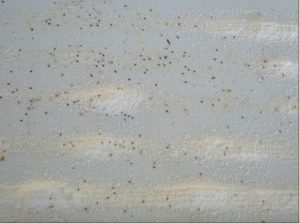
Varroa mites, detached and dead in powdered sugar. (Oliver)
Olden practices are resurging once more, such as organic farming principles, or as Sir Albert Howard, a famous English botanist, names the act “Nature’s Farming”.
We must heed how deeply our actions impact the world. Our choices not only affect our economic fabric, the societal fabric for future generations, but for all life itself. We are all responsible for the survival of the planet and its inhabitants. The history of Tuskegee and its beekeeping history show how integral our impact can be.








